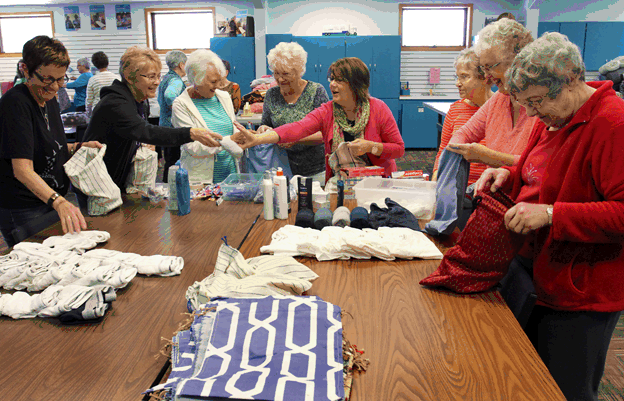
By Tina Schrag
May 2, 2017
In Kansas, men and women walk out of prison with $100 or less, the clothing on their backs and a bus ticket to wherever they have been paroled.
With those resources, they need to find a place to live and food to eat, get valid identification so they can apply for employment and find support to keep them from returning to prison.
Working Men of Christ (WMOC) in Wichita helps returning citizens navigate these challenges by providing free housing for nine months, helping them to find a church family and providing mentoring and accountability.
Mennonite Central Committee (MCC) Central States partners with WMOC by providing returning citizen care kits to the men and women WMOC supports. Volunteers donate the supplies – underwear, socks, undershirts and various hygiene items – and pack these new kits at MCC Central States Material Resources Center.
These kits, which Central States just began collecting in 2016, are delivered to the WMOC office in Wichita. Staff members distribute the kits to WMOC’s six houses in Wichita and Topeka.
“We place each kit on the made-up bed of each new resident that enters one of our six homes,†explains Spencer Lindsay, executive director for WMOC. “MCC kits help us to use our limited resources to help pay the bill for them to live with us until they find jobs.â€
The kits send a message of compassion.
“The returning citizen care kit says someone else is thinking about me,†said Rachel Cartmill, a WMOC house mentor. “It helps break down barriers because the bag is already waiting, like a gift.â€
“You feel alone when you get out of prison,†explained Rachel Cartmill, a house mentor at one of the houses in Wichita. “The MCC kits feel very personal. Women are sometimes very nervous coming to live here and the kit breaks that. It tells them that someone took the time to make this for me, and that helps them feel at home.â€
MCC Central States has expanded its attention to issues related to mass incarceration this year by sponsoring a learning tour to Angola State Penitentiary in New Orleans and by encouraging the collection of returning citizen care kits. In previous years, Central States collected prisoner care kits and encouraged churches to study The New Jim Crow, a book by Michelle Alexander and an accompanying curriculum promoted by MCC U.S. Washington Office.
Cindy Hastings of Newton, Kansas, said she was profoundly affected by reading and studying The New Jim Crow.
“To learn how America’s War on Drugs has so adversely affected an entire population made me angry and gave me a feeling utter helplessness to change the situation,†she said. “Individuals who are incarcerated suffer the loss of so many things the rest of us take for granted, and returning to society presents a wide spectrum of problems for them.”
“MCC is showing great insight into the reality of this issue by encouraging donations of returning citizen care kits to help people re-integrate into society after serving their sentences.â€
The mass incarceration problem calls for action, said Michelle Armster, executive director of MCC Central States. One fourth of all the prisoners in the world are held in U.S. prisons. In 1970, 357,292 men and women were incarcerated. By 2014, 2.3 million prisoners were held in America’s jails and prisons. Nearly 1 million (or 40 percent) of them are black.
“Central States is responding to the MCC shared strategy of addressing the racial disparities in the U.S. criminal justice system. This work engages us in following Jesus’ teaching from Matthew 25:36-40 to care for the least of these. We are responding to systemic injustice in our society.â€
Hastings encourages more people to donate kits to people who have completed their time in prison.
“Being able to help someone with some of humankind’s most basic needs is a way to encourage a returning citizen and let them know that there are those who care about them,†she said. “If more and more of us could donate these kits, more and more people’s lives might make small improvements, and we may contribute to a ripple effect of good change.â€
To learn more about supplies needed for returning citizen care kits and how to donate them, visithttps://mcc.org/get-involved/s


































